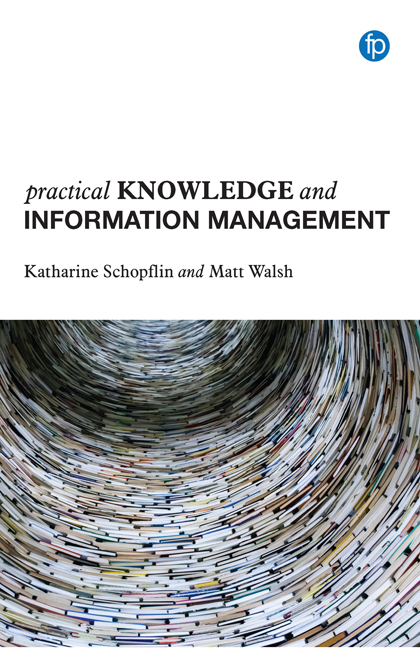Book contents
- Frontmatter
- Contents
- Case studies and sidebars
- 1 Introduction to knowledge and information management
- 2 Introducing knowledge and information management to organizations
- 3 Information management and governance
- 4 Communities and knowledge-sharing
- 5 Making knowledge explicit: knowledge bases, know-how and wikis
- 6 Capturing knowledge legacy: passing on staff knowledge
- Afterword: the future of knowledge and information management
- References
- Index
6 - Capturing knowledge legacy: passing on staff knowledge
Published online by Cambridge University Press: 01 June 2019
- Frontmatter
- Contents
- Case studies and sidebars
- 1 Introduction to knowledge and information management
- 2 Introducing knowledge and information management to organizations
- 3 Information management and governance
- 4 Communities and knowledge-sharing
- 5 Making knowledge explicit: knowledge bases, know-how and wikis
- 6 Capturing knowledge legacy: passing on staff knowledge
- Afterword: the future of knowledge and information management
- References
- Index
Summary
This chapter looks at techniques to capture organizational legacy knowledge. The approaches taken in the book so far all do this to some extent, but this chapter highlights the risks of unconsidered staff turnover and what you can do to prevent corporate knowledge disappearing. We look at two approaches to ensure that the most valuable staff knowledge and information does not disappear over time.
In his 2002 article, Wilson said ‘whatever businesses claim about people being their most important resource, they are never reluctant to rid themselves of that resource (and the knowledge it possesses) when market conditions decline’. The modern workplace is characterised by a high staff turnover, frequent restructures and in some organizations an internal competition and blame culture. This all has the potential to lead to knowledge disappearing from organizations without anyone noticing. Moreover, in an environment where employees struggle to keep their jobs, and have to reinvent themselves with every restructuring, there is little motivation to share professional secrets.
Efficient HR managers design job roles to be interchangeable. This enables staff to transfer easily when vacancies become available and allows natural wastage without redundancy payments. But it does not encourage sharing. If I am not identified by the special knowledge I bring to this job, or have acquired during its course, what motivation do I have to create a legacy? Temporary and zero hour contracts exacerbate the problem of knowledge loss. Staff in those circumstances may be perpetually looking for another job, even where they feel a commitment to the organization they currently work for. It is rare for managers in many organizations to take a considered approach to the problem when staff leave. And where they do, they usually concentrate on positions in the upper echelons. Corporate hierarchies conceal the fact that essential corporate knowledge can be embodied in quite junior people. These people leave organizations without much attention.
Recognition of this problem is not new. Beazley, Boenisch and Harden's book Continuity Management predicted a demographic time bomb in the USA as the baby boomer generation retired, taking their expertise and knowledge with them (2002, 9). They identified what they called ‘knowledge continuity’ as essential for organizations to maintain their competitive advantage (51–3).
- Type
- Chapter
- Information
- Practical Knowledge and Information Management , pp. 91 - 107Publisher: FacetPrint publication year: 2018

